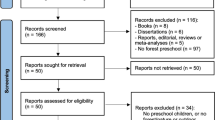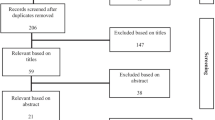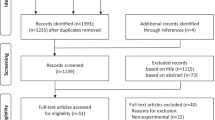Abstract
Outdoor adventure activities, typically originating from other countries, form the basis of most Australian outdoor education programs. Research on adventure-based outdoor education in Australia and elsewhere has tended to focus on determining the benefits of participating in such programs. Less attention has been paid to a critical examination of the educational rationale for the use of adventure activities in outdoor education contexts. This paper draws on contemporary outdoor education literature, particularly socially and culturally critical perspectives, to highlight educational issues and questions about the nature and role of adventure activities in outdoor education. It draws particular attention to issues related to social justice and environmental education objectives and suggests a need for further scrutiny of the congruence between theory and practice.
Similar content being viewed by others
References
Allin, L. (2000). Women into outdoor education: Negotiating a male-gendered space-issues of physicality. In B. Humberstone, (Ed.), Her Outdoors, Challenge and Adventure in Gendered Open Spaces (pp. 51–68). Brighton, UK: Leisure Studies Association.
Bailey, J. (1999). A world of adventure education, In J. C. Miles. & S. Priest (Eds.), Adventure Programming (pp. 39–44). State College Pennsylvania: Venture.
Brookes, A. (1993) Deep and shallow outdoor education: Can we tell the difference? The Outdoor Educator, June, 8–17.
Brookes, A. (1998). Place and experience in Australian outdoor education and nature tourism. In Outdoor Recreation- Practice and Ideology from an International Comparative Perspective (pp.1–11). Umea, Sweden.
Brookes, A. (2002). Lost in the Australian bush: Outdoor education as curriculum. Journal of Curriculum Studies. 34, 405–425.
Brookes, A. (2003). Character building. Why it doesn’t happen, why it can’t be made to happen, and why the myth of character building is hurting the field of outdoor education. In S. Polley (Ed.), 13th National Outdoor Education Conference (pp. 19–24). Marion, South Australia: Outdoor Educators Association of South Australia.
Cook, L (2001). Different social and political influences on girls and boys through education out of doors in the United Kingdom. Journal of Adventure Education and Outdoor Learning, 1(2), 43–52.
Cooper, G. (1998). Outdoors with young people: A leader’s guide to outdoor activities, the environment and sustainability. Lyme Regis: Russell House.
Gough, N. (1990). Imagining our relationships with nature. In Connections: a conference for the environment, the outdoors and camping. Paper presented at the joint Conference of theVictorian Outdoor Education Association, Camping Association Victoria and the Victorian Association of Environmental Education, La Trobe University Bendigo, 1990.
Greenaway, R. (2003). Exploring the Ingredients of Outdoor Adventure: Research summary, [online]. Retrieved 27 May, 2003 from http://reviewing.co.uk/research/wad_sum.htm# adventure
Haluza-Delay, R. (1999). The culture that constrains: Experience of ‘nature’ as part of a wilderness adventure program. The Journal of Experiential Education, 22(3), 129–137.
Humberstone, B. (2000). The ‘outdoor industry’ as social and educational phenomena: Gender and outdoor adventure/education. Journal of Adventure Education and Outdoor Learning, 1(1), 21–35.
Humberstone, B., & Pederson, K. (2000). Gendered ‘natural’ spaces: A comparison of contemporary women’s experiences of outdoor adventure (UK) and frilutsliv (Norway). In B. Humberstone, (Ed.), Her Outdoors, Challenge and Adventure in Gendered Open Spaces, (pp. 101–112). Brighton, UK: Leisure Studies Association.
Kiewa, J. (2001). Stepping around things: Gender relationships in climbing. Australian Journal of Outdoor Education, 5(2), 4–12.
Lugg, A., & Martin, P. (2001). The nature and scope of outdoor education in Victorian schools. Australian Journal of Outdoor Education, 5(2), 42–48.
Martin, P. (1998). Education ideology and outdoor leadership education: Why ORCA and the AOEC exist. Australian Journal of Outdoor Education, 3(1), 14–19.
Martin, P. (1999). Critical outdoor education and nature as a friend. In J. C. Miles. & S. Priest (Eds.), Adventure Programming (pp. 463–470). State College Pennsylvania: Venture.
Martin, P. (2003). The heart of outdoor education’s contribution to the 21st century. Proceedings of the 13th National Outdoor Education Conference, Adelaide, South Australia, pp. 205–228.
McRae, K. (Ed.) (1990). Outdoor and environmental education: Diverse purposes and practices. South Melbourne: McMillan.
Mortlock, C. (1987). The adventure alternative. Milnthorpe, Cumbria: Cicerone.
Neill, J. (2001) A profile of outdoor education programs and their implementation, Japanese Outdoor Education Journal, 5(2), 1–9. Retrieved November 18th, 2003 from http://www.wilderdom.com/abstracts/Neill2001ProfileOutdoorEducationProgramsAustralia.htm.
Nicol, R. & Higgins, P. (1998). A sense of place: A context for environmental outdoor education. In P. Higgins. & B. Humberstone (Eds.), Celebrating Diversity: Learning by Sharing Cultural Differences, Third European Congress for Outdoor Adventure Education and Experiential Learning, (pp.50–55).
Nicol, R. (2002a). Outdoor education: research topic or universal value? Part Two. Journal of Adventure Education and Outdoor Learning, 2(2), 85–99.
Nicol, R. (2002b). Outdoor environmental education in the United Kingdom: A conceptual framework of epistemological diversity and its educational implications. Canadian Journal of Environmental Education, 7(2), Spring, 207–223.
Payne, P. (2002). On the construction, deconstruction and reconstruction of experience in ‘critical’ outdoor education. Australian Journal of Outdoor Education, 6(2), 4–21.
Picket, B., & Polley, S. (2001). Investigating the history of outdoor education in South Australia. Australian Journal of Outdoor Education, 5(2), 49–53.
Polley, S., & Pickett, B. (2003) The nature and scope of outdoor education in South Australia: A summary of key findings. Australian Journal of Outdoor Education, 7(2)
Preston, L. (2001). Seeing the unseen: A rock climbing experience. Australian Journal of Outdoor Education, 5(2), 13–18.
Priest, S. (1999a). Introduction. In J. C. Miles. & S. Priest (Eds.), Adventure Programming. (pp.xiii–xiv). State College Pennsylvania: Venture.
Priest, S. (1999b). The semantics of adventure programming. In J. C. Miles. & S. Priest (Eds.), Adventure Programming (pp. 111–114). State College Pennsylvania: Venture.
Purdie, N., & Neill, J. (1999). Japanese students down-under: Is Australian outdoor education relevant to other cultures? Australian Journal of Outdoor Education, 4(1), 48–57.
Quay, J., Dickinson, S., & Nettleton, B. (2000). Community, caring and outdoor education. Australian Journal of Outdoor Education, 5(1), 4–18.
Raioloa, E., & O’Keefe, M. (1999). Philosophy in practice: A history of adventure programming, in J.C. Miles, & S. Priest (Eds.), Adventure Programming (45–53). State College Pennsylvania: Venture, pp. 45–53.
Slattery, D. (2001). What can environmental history offer outdoor education practitioners? Australian Journal of Outdoor Education, 5(2), 28–33.
Wurdinger, S. (1997). Philosophical issues in adventure education (3rd ed.). Dubuque, Iowa: Kendall/Hunt.
Additional information
Alison Lugg has recently joined the outdoor education section of the Scottish Centre for Physical Education, Sport and Leisure Studies at The University of Edinburgh where she is lecturing in outdoor education and starting PhD study. She can be contacted on alisonl@education.ed.ac.
Rights and permissions
About this article
Cite this article
Lugg, A. Outdoor adventure in Australian outdoor education: Is it a case of roast for Christmas dinner?. Journal of Outdoor and Environmental Education 8, 4–11 (2004). https://doi.org/10.1007/BF03400790
Published:
Issue Date:
DOI: https://doi.org/10.1007/BF03400790




